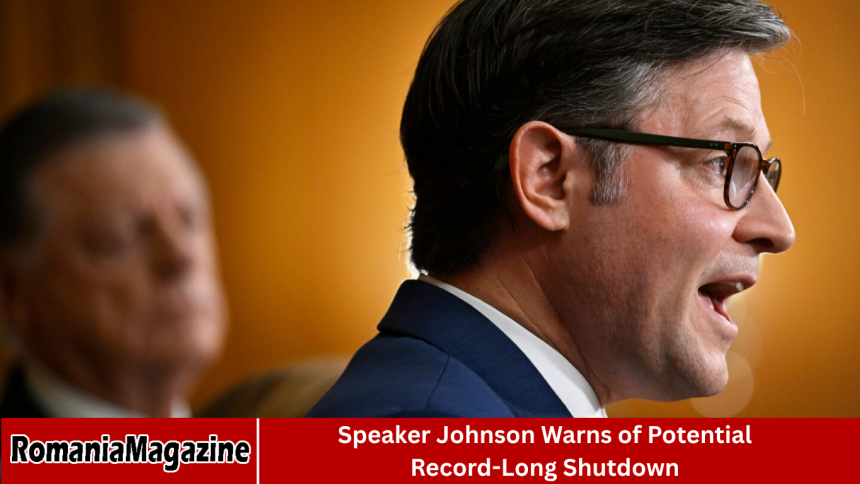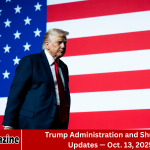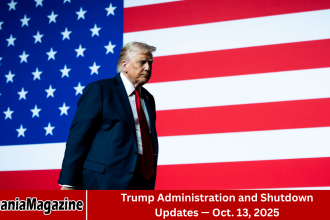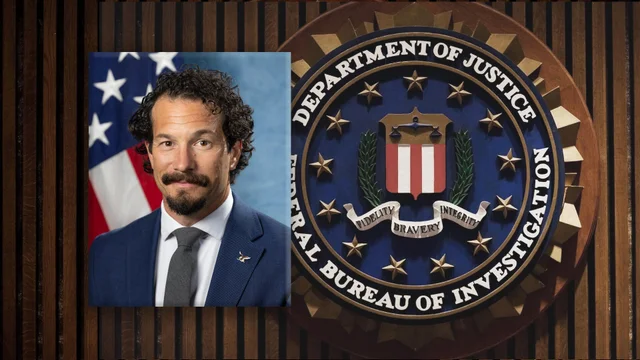The political landscape in Washington is once again under immense strain as U.S. House Speaker Mike Johnson warns that the country could face one of the longest government shutdowns in American history. His stark warning comes amid escalating tensions between Republican.
- Understanding the Warning: What Speaker Johnson Said
- The Political Divide: What’s Causing the Standoff?
- Historical Context: Lessons from Previous Shutdowns
- Economic and Social Impact of a Prolonged Shutdown
- The Political Calculus: Who Stands to Gain or Lose?
- Possible Outcomes: How Could This End?
- Short-Term Extension (Continuing Resolution):
- Comprehensive Bipartisan Deal:
- Prolonged Shutdown:
- Public and Market Pressure Forces Action:
- The Global Perspective: International Repercussions
- Public Reaction: Anxiety and Frustration
- Can a Record-Long Shutdown Be Avoided?
- Frequently Asked Question
- What is a government shutdown?
- Why is Speaker Johnson warning about a record-long shutdown?
- How does a shutdown affect ordinary Americans?
- How long can a government shutdown last?
- Who is usually blamed for government shutdowns?
- What can be done to prevent the shutdown?
- How would a prolonged shutdown affect the economy?
- Conclusion
With government funding set to expire soon, the possibility of a federal shutdown is growing stronger by the day. Speaker Johnson’s comments have drawn national attention—not only because of the political implications but also due to the potential economic and social impact such a shutdown could cause.
This article delves into the details of Speaker Johnson’s warning, the causes behind the looming shutdown, the stakes for both parties, and what a prolonged government closure could mean for the American public and global markets.
More Read: South Africa Battle Pakistan’s Spinners to Reach 216-6 in First Test
Understanding the Warning: What Speaker Johnson Said
House Speaker Mike Johnson, in recent remarks to reporters and colleagues, cautioned that the United States might be headed toward a “record-long” government shutdown if Congress fails to reach a budget deal. He emphasized that the divide between the Republican-controlled House.
And the Democratic-led Senate remains wide on key spending priorities. According to Johnson, the standoff reflects deeper ideological divisions—particularly over government spending levels, immigration control, and foreign aid.
He warned that without compromise, the federal government could enter a prolonged period of paralysis, with agencies shuttered, employees furloughed, and essential services disrupted.
“We cannot continue on this unsustainable path,” Johnson said. “But if the administration and Senate Democrats refuse to come to the table in good faith, this shutdown could be longer than any we’ve seen before.”
His comments reflect growing frustration within his party, where hardline conservatives are pushing for deeper spending cuts, while moderates fear the economic backlash of a prolonged shutdown.
The Political Divide: What’s Causing the Standoff?
At the heart of the looming crisis are competing visions for the federal budget. Republicans’ Position: Many House Republicans, especially those aligned with the Freedom Caucus, are demanding significant reductions in domestic spending.
They argue that the national debt—now exceeding $35 trillion—poses a long-term threat to economic stability. They also want stronger border security measures and are pushing for stricter controls on foreign aid.
- Democrats’ Position: On the other side, Democrats insist on maintaining funding for social programs, healthcare, and education, while also supporting aid packages for U.S. allies abroad. They accuse Republicans of holding the government hostage for political leverage.
- The Biden Administration’s Role: President Joe Biden and his team have urged Congress to pass a clean funding bill without attaching partisan policy riders. The White House argues that brinkmanship over the budget only harms ordinary Americans and erodes confidence in government institutions.
The combination of these conflicting priorities has created a legislative stalemate, with both chambers struggling to agree on even short-term stopgap measures.
Historical Context: Lessons from Previous Shutdowns
Government shutdowns are not new in U.S. politics. Since the modern budgeting process began in 1976, there have been 21 shutdowns, ranging in duration from a few hours to over a month.
- The 1995-96 Shutdown: During President Bill Clinton’s tenure, a dispute with House Speaker Newt Gingrich led to a 21-day shutdown, which backfired politically against the Republicans.
- The 2013 Shutdown: Under President Barack Obama, a 16-day shutdown occurred over disagreements related to the Affordable Care Act.
- The 2018-19 Shutdown: The longest in U.S. history, lasting 35 days, occurred when President Donald Trump and congressional Democrats clashed over funding for the U.S.-Mexico border wall.
Each shutdown left behind a trail of economic loss and political fallout. Analysts estimate that the 2018-19 closure cost the U.S. economy $11 billion, with $3 billion permanently lost, according to the Congressional Budget Office (CBO).
Speaker Johnson’s current warning suggests that if lawmakers remain entrenched, this time could be even worse.
Economic and Social Impact of a Prolonged Shutdown
A government shutdown affects far more than politicians in Washington. Its ripple effects spread across the economy, hitting federal workers, businesses, and communities nationwide.
Impact on Federal Workers
Approximately 4 million federal employees, including both civilian and military personnel, could face furloughs or work without pay. During past shutdowns, workers in critical sectors such as homeland security, transportation.
And health services continued to work without compensation, relying on delayed paychecks once the government reopened.
Impact on the Economy
The longer a shutdown lasts, the more damage it inflicts on the national economy. Delays in federal contracts, tourism decline, and halted government services all contribute to financial losses. Small businesses dependent on federal customers or permits often face severe disruptions.
Impact on Public Services
- National parks and museums would close.
- Social Security offices would experience delays in processing claims.
- IRS operations could slow down, delaying refunds.
- New small business loans and housing assistance programs would be paused.
The uncertainty can also shake investor confidence, potentially leading to market volatility.
The Political Calculus: Who Stands to Gain or Lose?
Political observers are debating which party could emerge stronger—or weaker—from a potential record-long shutdown.
For Republicans:
While Speaker Johnson faces pressure from his conservative flank to hold firm on spending cuts, a prolonged shutdown could alienate moderate voters and damage the GOP’s reputation for governance.
The Republican Party risks being blamed for economic hardships caused by the impasse, much like during the 2018-19 shutdown.
For Democrats:
President Biden and Democratic leaders may use the crisis to portray themselves as defenders of working Americans and stability. However, if the shutdown drags on and disrupts critical services, public frustration could also turn against them.
For Johnson Personally:
As Speaker, Johnson’s leadership is being tested. His ability to balance the demands of hardliners and moderates could determine his long-term standing within the Republican Party. A failure to avoid or manage the shutdown effectively could weaken his speakership.
Possible Outcomes: How Could This End?
Several scenarios could unfold in the coming weeks:
Short-Term Extension (Continuing Resolution):
Congress could agree to a temporary funding measure to buy time for further negotiations. However, this would only delay the problem rather than solve it.
Comprehensive Bipartisan Deal:
A full-year spending package could be reached through compromise. This would require concessions from both sides—something that seems unlikely at the moment.
Prolonged Shutdown:
If no agreement is reached, the government could enter a historic shutdown that lasts for weeks or even months. This is the scenario Johnson alluded to as the “longest in history.”
Public and Market Pressure Forces Action:
Historically, mounting public anger and market instability have forced lawmakers to act. If the shutdown causes widespread harm, political leaders may face no choice but to strike a deal.
The Global Perspective: International Repercussions
A prolonged U.S. shutdown wouldn’t just hurt Americans—it could also send shockwaves through the global economy.
- Financial Markets: As the world’s largest economy, U.S. fiscal dysfunction can lead to uncertainty in global markets. Investors may flee to safer assets, driving volatility in stocks and currencies.
- International Aid: Funding delays for programs abroad, including humanitarian and military assistance, could impact global stability.
- Allied Confidence: Prolonged internal dysfunction may weaken U.S. credibility with allies, particularly during a time of growing geopolitical tensions involving Russia, China, and the Middle East.
Public Reaction: Anxiety and Frustration
Across the country, ordinary Americans are expressing frustration over what many view as another example of political gridlock in Washington. Social media platforms are filled with concerns about lost wages, delayed benefits, and rising living costs.
Many citizens believe that both parties are failing to prioritize the public’s needs. “They’re playing political games while we’re the ones who suffer,” one federal worker in Virginia said.
Polls consistently show that a majority of Americans disapprove of shutdowns as a negotiation tactic. As the potential crisis looms, public opinion could play a decisive role in pressuring lawmakers to act.
Can a Record-Long Shutdown Be Avoided?
While the situation is dire, it’s not hopeless. Lawmakers still have opportunities to avert disaster if they act quickly and responsibly.
- Negotiation and Compromise: Both sides must recognize the importance of finding middle ground.
- Public Accountability: Voters can hold leaders accountable by making their voices heard through calls, letters, and civic engagement.
- Transparency and Communication: Clear public messaging about the stakes of the shutdown can build pressure for resolution.
Speaker Johnson himself has indicated that he remains open to negotiation but insists that “fiscal responsibility cannot be ignored any longer.” If both sides can find a path forward, they may yet prevent what could become the longest shutdown in U.S. history.
Frequently Asked Question
What is a government shutdown?
A government shutdown occurs when Congress fails to pass sufficient funding legislation for federal agencies. As a result, non-essential operations are suspended, and millions of federal employees are furloughed or work without pay.
Why is Speaker Johnson warning about a record-long shutdown?
Speaker Johnson believes that without significant compromise between Republicans and Democrats, the ongoing budget standoff could last longer than any previous shutdown in U.S. history—potentially exceeding the 35-day record set in 2018-19.
How does a shutdown affect ordinary Americans?
A shutdown disrupts many services, including passport processing, national parks, small business loans, and tax refunds. Federal employees may miss paychecks, and economic growth slows due to reduced government spending.
How long can a government shutdown last?
There is no set limit. Shutdowns last until Congress passes and the President signs funding legislation. The longest on record lasted 35 days, but analysts warn the upcoming one could last even longer.
Who is usually blamed for government shutdowns?
Historically, the party perceived as being unwilling to compromise tends to face more public backlash. During past shutdowns, polling showed Republicans often bore greater blame, though both parties can suffer politically.
What can be done to prevent the shutdown?
Lawmakers can pass a continuing resolution to temporarily fund the government while negotiations continue, or reach a bipartisan budget deal that satisfies both spending and policy priorities.
How would a prolonged shutdown affect the economy?
A long shutdown could slow GDP growth, disrupt federal contracts, delay benefits, and cause stock market volatility. The Congressional Budget Office estimates that several billion dollars could be permanently lost from economic output.
Conclusion
The warning from Speaker Johnson underscores the fragile state of American governance in 2025. The looming shutdown is more than a budgetary dispute—it’s a test of political will, responsibility, and leadership.
Whether or not the government grinds to a halt will depend on the ability of lawmakers to put aside partisan interests and prioritize national stability. The consequences of failure could be profound—not only for the economy but for the faith of citizens in their government.










